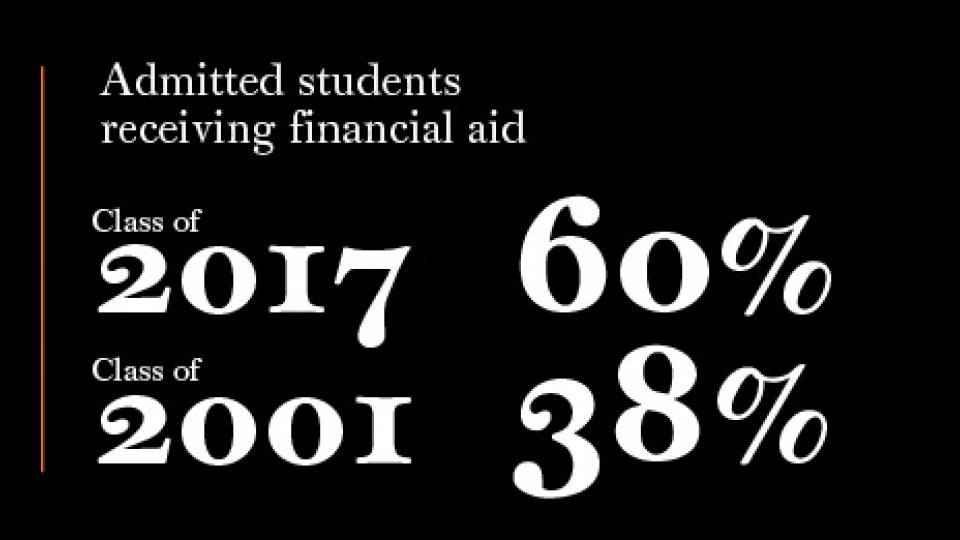Princeton University trustees Jan. 23 approved one of the lowest percentage increases in undergraduate tuition and fees since 1966 -- 3.3 percent -- while also endorsing a 9.6 percent increase in the financial aid budget. The authorizations came as the University is in the midst of a two-year plan to reduce its operating budget by $170 million.
"We believe this recommendation strikes a reasonable balance that recognizes both the University's budgetary challenges and the need to avoid putting unnecessary burdens on tuition-paying families," said Provost Christopher Eisgruber.
Last year, the trustees approved the lowest percentage increase in the fee package in 43 years at 2.9 percent.
The boost in the financial aid budget for 2010-11-- from $103.2 million to $113.1 million -- is intended so that the University can continue to meet the full need of all admitted students. It also incorporates changes in the percentage of undergraduates on financial aid. This year, more than 60 percent of Princeton freshmen are on aid; next year, as much as 63 percent of the class of 2014 is expected to be on aid.
"The University's financial aid program is the most important vehicle for ensuring that a Princeton education is affordable to all the University's students," Eisgruber said. "For students on aid, the family contribution and the student's work expectation are not increased when tuition and fees rise. However, we recognize that the cost of a Princeton education puts substantial burdens on families that do not qualify for aid, especially those only slightly above the aid threshold."
The projected budget increase in the financial aid program will continue significant enhancements the University has made over the past 12 years, including replacing all required loans with grants that do not need to be repaid. This year the average grant for a student on financial aid is $36,000. These efforts have dramatically increased the economic diversity of Princeton's student body. The 60 percent of this year's freshman class on financial aid is a striking change from the class of 2001 -- the last class admitted before the enhancements to the aid program -- when 38 percent of the freshmen were on aid.
Princeton's undergraduate charges next year will include: $36,640 for tuition, a 3.7 percent increase from $35,340 in 2009-10; $6,467 for room, up 2 percent from $6,340; and $5,473 for board, an increase of 2.5 percent from $5,340.
The trustees also approved a 3.7 percent ($1,300) increase in the regular graduate tuition, from $35,340 to $36,640, the same as undergraduate tuition; a 3.7 percent ($100) increase in the Dissertation Completion Enrollment (DCE) graduate tuition, from $2,680 to $2,780; average increases in room and board rates at the Graduate College of 2 percent and 2.5 percent, respectively; and an increase in renewal rental rates of 2 percent for most graduate student apartments. In addition, they approved a 1 percent increase in graduate student stipends.
The University expects to increase the Student Health Plan fee from $1,270 to $1,450 for 2010-11. This increase is required to offset rapidly rising medical costs.
Gratitude, discipline and human capital
The fee packages were part of a 2010-11 overall balanced operating budget of $1.36 billion adopted by the board at its Jan. 23 meeting. The trustees acted on a proposal from President Shirley M. Tilghman that was based on the recommendations of the Priorities Committee of the Council of the Princeton University Community. Composed of faculty, students and staff, the committee has served for four decades as the mechanism for recommending fiscal and programmatic priorities.
"This year's Priorities Committee convened in the midst of a deep global recession," said Eisgruber, who chairs the committee. "The University's endowment had declined substantially when financial markets fell, and the University's administration responded by formulating a two-year budget-reduction plan in the spring of 2009. By the time that the committee held its first meeting in October, the University's managers were already well on their way to meeting fiscal year 2011 budget reduction targets. Rather than hearing requests for additions to budget, as the Priorities Committee usually does, this year's committee listened as cabinet officers described their budget reduction plans."
Eisgruber said three conclusions emerged from the committee's deliberations:
• "respect for, and gratitude to, the faculty members, staff, students, alumni and friends of the University who have pulled together to help Princeton weather this economic storm." The committee commended University managers for developing thoughtful budget reduction plans that not only saved money but also protected the University's core mission and campus community.
• the need to maintain budget discipline and to search for new opportunities to cut costs and operate more efficiently. "While Princeton has made excellent progress, we are not yet out of the woods," he said.
• the importance of protecting the University's human capital. "Princeton's people are the key to its excellence," Eisgruber said. "If the University is to retain its outstanding faculty and staff, it must be able to offer salary increases that recognize meritorious performance." Although the committee reluctantly agreed that Princeton's budgetary situation permitted it to offer only minimal salary pools in fiscal year 2011, the committee stressed the importance of moving toward more generous pools in fiscal year 2012.
For 2010-11 (fiscal year 2011), base salary pools will provide 1.5 percent raises to almost all University faculty and staff members (except for members of the president's cabinet, who will receive no raises), up to a maximum increase of $2,000. Because the salary pools are so small, managers will not be asked to make merit-based differentiations among employees; virtually all employees will receive a 1.5 percent raise (up to the $2,000 cap) unless their performance was unsatisfactory. In addition, centrally managed resources will be available to pay for staff promotions and for faculty promotions and special achievements.
The Priorities Committee report is available for download in PDF format as well as from the Office of the Provost.
